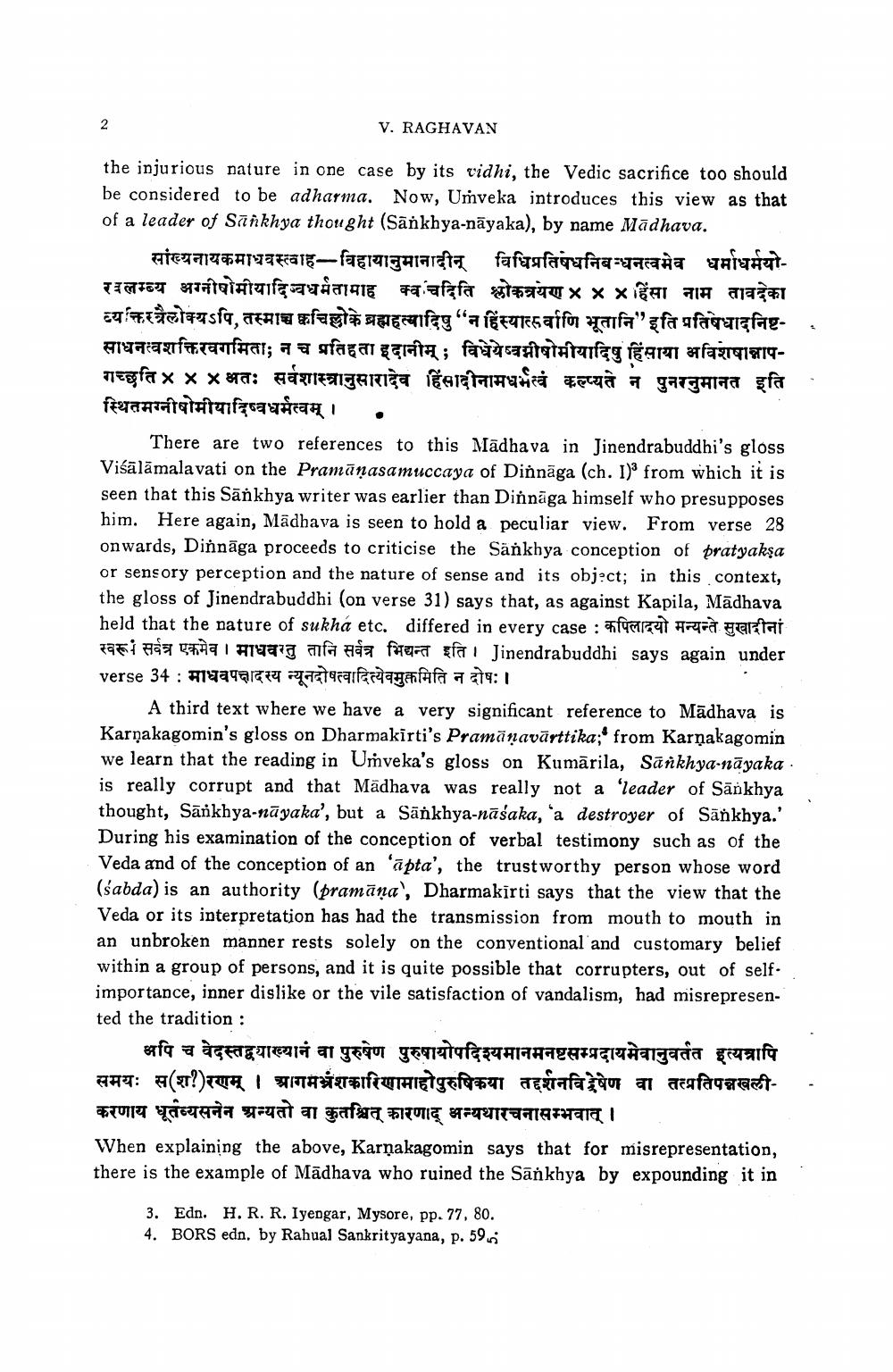Book Title: Madhava An Early Unfaithful Exponent Of The Sankhya Author(s): V Raghavan Publisher: V Raghavan View full book textPage 2
________________ V. RAGHAVAN the injurious nature in one case by its vidhi, the Vedic sacrifice too should be considered to be adharma. Now, Uñveka introduces this view as that of a leader of Sankhya thought (Sankhya-nayaka), by name Madhava. सांख्यनायकमाधवस्त्वाह-विहायानुमानादीन् विधिप्रतिषधनिबन्धनत्वमेव धर्माधर्मयोरवलम्ब्य अग्नीषोमीयादिज्वधर्मतामाह क्वचदिति श्लोकत्रयण x x x हिंसा नाम तावदेका व्यक्तिरत्रैलोक्यऽपि, तस्माच्च क्वचिल्लोके ब्रह्महत्यादिषु "न हिंस्यासर्वाणि भूतानि" इति प्रतिषेधादनिष्टसाधनत्वशक्तिरवगमिता; न च प्रतिहता इदानीम् ; विधेयेष्वग्नीषोमीयादिषु हिंसाया अविशषान्नापगच्छति x x x अतः सर्वशास्त्रानुसारादेव हिंसादीनामधर्मत्वं कल्प्यते न पुनरनुमानत इति स्थितमग्नीषोमीयादिष्वधर्मत्वम् । . There are two references to this Mādhava in Jinendrabuddhi's gloss Viśālāmalavati on the Pramāṇasamuccaya of Dinnāga (ch. 1)' from which it is seen that this Sāňkhya writer was earlier than Dinnāga himself who presupposes him. Here again, Madhava is seen to hold a peculiar view. From verse 28 onwards, Dinnāga proceeds to criticise the Sankhya conception of pratyakşa or sensory perception and the nature of sense and its obj:ct; in this context, the gloss of Jinendrabuddhi (on verse 31) says that, as against Kapila, Mādhava held that the nature of sukha etc. differed in every case : कपिलादयो मन्यन्ते सुखादीनां स्वरूप सर्वत्र एकमेव । माधवस्तु तानि सर्वत्र भिद्यन्त इति । Jinendrabuddhi says again under verse 34 : माधवपक्षादस्य न्यूनदोषत्वादित्येवमुक्तमिति न दोषः। A third text where we have a very significant reference to Madhava is Karņakagomin's gloss on Dharmakirti's Pramāņavārttika;" from Karņakagomin we learn that the reading in Umveka's gloss on Kumarila, Sankhya-nayaka . is really corrupt and that Madhava was really not a 'leader of Sānkhya thought, Sāňkhya-nāyaka', but a Sānkhya-nāšaka, 'a destroyer of Sānkhya.' During his examination of the conception of verbal testimony such as of the Veda and of the conception of an 'apta', the trustworthy person whose word (sabda) is an authority (pramāna', Dharmakirti says that the view that the Veda or its interpretation has had the transmission from mouth to mouth in an unbroken manner rests solely on the conventional and customary belief within a group of persons, and it is quite possible that corrupters, out of selfimportance, inner dislike or the vile satisfaction of vandalism, had misrepresented the tradition : __ अपि च वेदस्तद्वयाख्यानं वा पुरुषेण पुरुषायोपदिश्यमानमनष्टसम्प्रदायमेवानुवर्तत इत्यत्रापि समयः स(श?)रणम् । आगमभ्रंशकारिणामाहोपुरुषिकया तद्दर्शनविद्वेषेण वा तत्प्रतिपन्नखलीकरणाय धूतव्यसनेन अन्यतो वा कुतश्चित् कारणाद् अन्यथारचनासम्भवात् । When explaining the above, Karņakagomin says that for misrepresentation, there is the example of Mādhava who ruined the Sankhya by expounding it in 3. Edn. H. R. R. Iyengar, Mysore, pp. 77, 80. 4. BORS edn. by Rahual Sankrityayana, p. 59.Page Navigation
1 2 3
